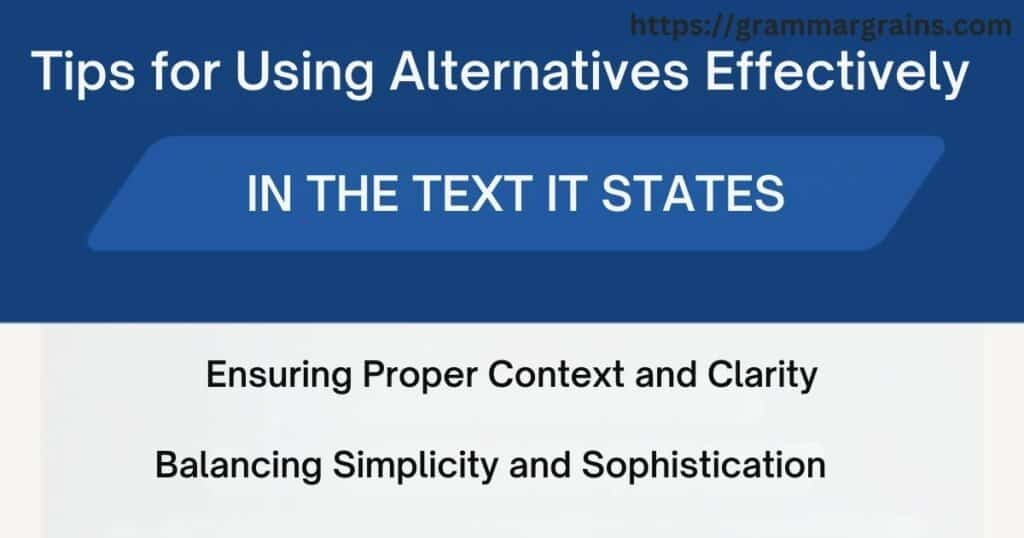Looking for ways to elevate your writing? Comprehensive alternatives to “The Text States” can transform your language into something more engaging and impactful.
Why does this matter? Overusing clichéd expressions can bore readers and dilute your message.
This article explores dynamic options for replacing overused phrases in academic writing and professional settings, ensuring your work stands out.
Why Choose Alternatives to “The Text States”?

Using the same phrases repeatedly can make writing dull and predictable.
This is especially true in academic writing and professional settings, where engaging language is essential.
Phrases like “The Text States” are common, but their overuse can limit clarity and make your work seem uninspired.
Choosing alternative expressions not only enhances readability but also demonstrates a broader command of language.
It’s about maintaining a professional tone while avoiding redundancy.
Using diverse terminology helps in connecting with your audience effectively and keeping their attention.
Why Variety Matters
Variety in phrasing shows your audience that you have a rich vocabulary.
It helps maintain their interest, especially in longer texts.
For example, a research paper or technical document often needs to highlight key points.
Overusing a single phrase like “The Text States” makes the writing feel repetitive. By switching between alternatives such as “The passage suggests” or “The author asserts,” you create a more dynamic and polished piece.
A Practical Example
Imagine a literary analysis on Jane Austen’s Pride and Prejudice.
Instead of saying,
“The text states that Elizabeth Bennet values independence,”
try saying,
“The excerpt reveals Elizabeth’s strong preference for personal autonomy.”
This subtle shift keeps your analysis fresh while conveying the same information.
Importance of Variety in Writing

Varied language makes writing more engaging and ensures better reader engagement.
Readers appreciate when authors use creative phrasing to convey information.
It also allows for a better flow of ideas and prevents repetitive structures from distracting the reader.
In academic context or technical documents, alternatives to phrases like “The Text States” improve the narrative flow and emphasize significant points.
This is crucial for effectively communicating specific observations and maintaining a friendly tone.
Impact on Professional Communication
In professional documents, variety ensures clarity and conciseness.
Imagine drafting a business proposal.
Using phrases like
“The report illustrates”
or
“The analysis proposes”
ensures your language remains professional.
It also conveys confidence and credibility to stakeholders.
Enhancing Academic Writing
In research papers, you often need to reference prior work.
Instead of relying on “The text states,” opt for “The findings indicate” or “The literature emphasizes.”
These variations help highlight the importance of your references without sounding repetitive.
What Does “The Text States” Mean?

Definition and Context
The phrase “The Text States” is often used to quote or reference specific information from a source.
It highlights the content’s direct message without adding personal interpretation.
Common Usage in Writing
You’ll frequently find it in research findings, literary analysis, and legal document analysis.
For instance, in Jane Austen’s Pride and Prejudice, one might say,
“The text states that Elizabeth Bennet values independence over societal norms.”
Is It Professionally Good to Use “The Text States”?

Advantages of Using the Phrase
Using “The Text States” can add direct communication to your writing.
It provides clarity and avoids misinterpretation.
This is especially valuable in scientific research and legal analysis, where precision matters.
Limitations and Potential Overuse
However, relying too heavily on this phrase can make writing monotonous.
Overuse often reduces its impact, making it harder to highlight something important.
Alternatives can help maintain balance and ensure your work is engaging.
Benefits of Using Alternatives

Enhancing Readability and Engagement
Alternatives to “The Text States” make your work dynamic.
They allow you to express yourself in fresh ways, which can improve reader engagement.
For instance, saying “The passage claims” or “The article articulates” adds variety.
Avoiding Redundancy
By choosing synonyms like
“The excerpt reveals”
or
“The study demonstrates,”
you can avoid repeating the same phrases.
This approach ensures that your writing remains clear and impactful.
Comprehensive List of Alternatives

25 Other Ways to Say “The Text States” (With Examples)
| Phrase | Example |
|---|---|
| The Passage Claims | The passage claims that early education is key to development. |
| The Article Articulates | The article articulates the need for sustainable energy solutions. |
| The Writing Specifies | The writing specifies the benefits of community engagement. |
| The Section Mentions | The section mentions the historical significance of the event. |
| The Author Asserts | The author asserts the importance of emotional intelligence in leadership. |
| The Document Highlights | The document highlights recent advancements in AI technology. |
| The Excerpt Reveals | The excerpt reveals a shift in public opinion over time. |
| The Text Indicates | The text indicates a correlation between diet and health. |
| The Passage Demonstrates | The passage demonstrates the effects of climate change on agriculture. |
| The Source Argues | The source argues for stricter environmental regulations. |
| The Literature Emphasizes | The literature emphasizes the need for further research in this area. |
| The Report Illustrates | The report illustrates the growth of renewable energy sectors. |
| The Findings Indicate | The findings indicate a positive trend in customer satisfaction. |
| The Narrative Conveys | The narrative conveys a sense of urgency and hope. |
| The Commentary Posits | The commentary posits that innovation drives economic growth. |
Synonyms for “In the Text It States”
Alternatives include phrases like
“According to the text,”
“As stated in the text,”
or
“The text reveals that.”
These expressions can be used to present specific information while maintaining a friendly tone.
When to Use Each Alternative

Matching Phrases with Context
Each phrase fits different scenarios.
For example,
“The author asserts”
works well in literary criticism, while
“The report illustrates”
suits marketing strategy analysis.
Guidelines for Academic vs. Professional Use
In academic writing, phrases like “The study demonstrates” are appropriate for formal papers.
For professional settings, consider using “The document highlights” or “The analysis proposes.”
Tips for Using Alternatives Effectively

Ensuring Proper Context and Clarity
Always match the phrase with its intended context.
Misuse can confuse readers and reduce credibility.
Balancing Simplicity and Sophistication
Keep your language accessible.
Avoid overly complex phrases unless necessary for the audience.
Conclusion
Incorporating alternative ways to say “The Text States” enriches your writing. It enhances both clarity and reader engagement.
Don’t hesitate to try new phrases. Experimenting with varied language will improve your communication and make your work stand out.
FAQs
What are the best synonyms for “The Text States”?
Some great options include “The passage claims,” “The article articulates,” and “The excerpt reveals.”
Why is it important to use alternatives?
Alternatives prevent redundancy, enhance reader engagement, and improve clarity.
How do I decide which phrase to use?
Match the phrase to the specific context and audience. Formal settings may require more precise expressions.
Can I use these alternatives in academic writing?
Yes, most alternatives are suitable for academic context. Ensure they align with the tone and purpose of your work.

Taila Lucy, an expert content writer at Grammar Grains, brings 4 years of experience crafting engaging pieces on grammar. Her work delves into synonyms, antonyms, slang, puns, and poetry, helping readers master English with creativity and flair.






